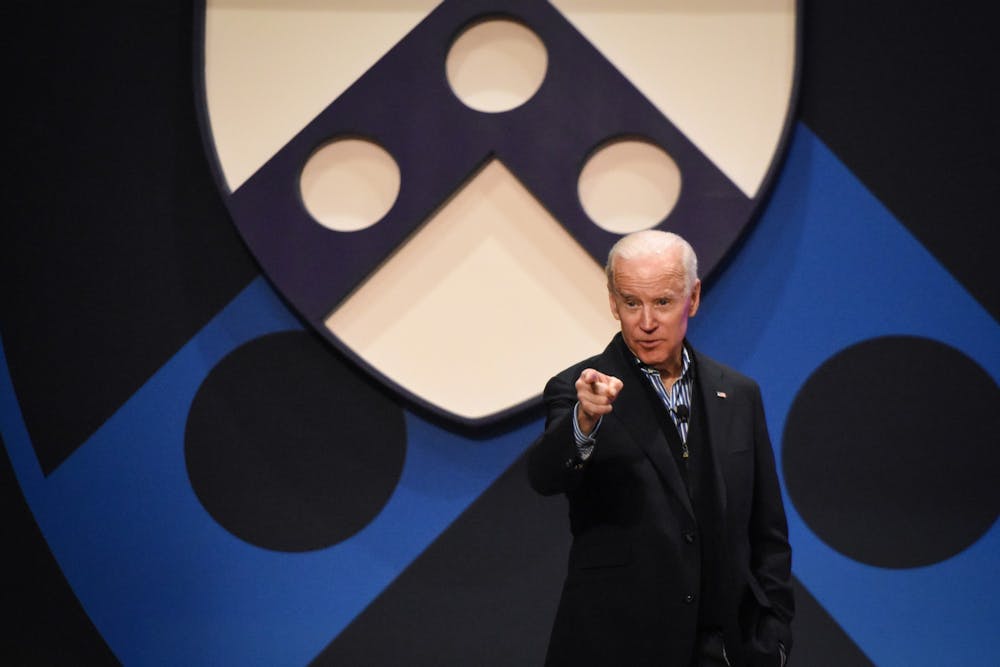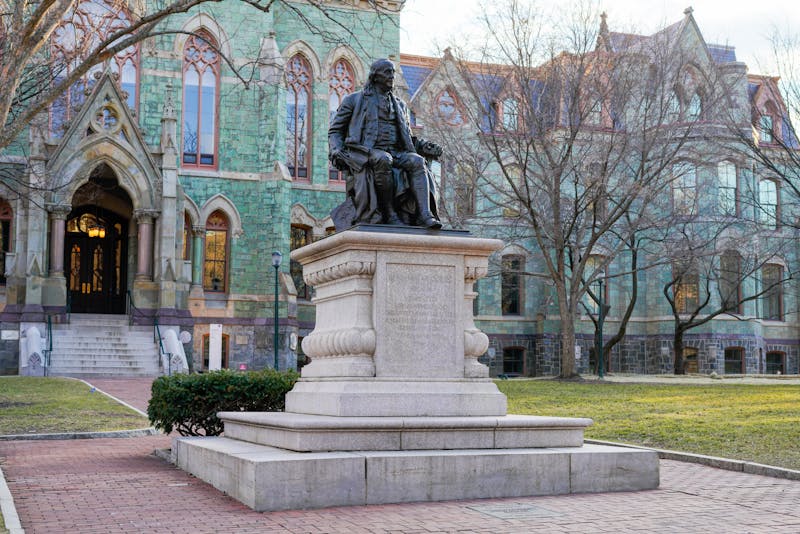
President Joe Biden stated that he does not support canceling loan debt for students from "elite" universities at a town hall in Feb.
Credit: Son NguyenPresident Joe Biden said that he does not support canceling loan debt for "people who have gone to Harvard and Yale and Penn" at a February town hall, sparking backlash from first-generation, low-income students.
At the town hall, Biden said that he would not consider a plan that would forgive up to $50,000 in debt, doubling down on his stance that he would instead cancel up to $10,000 in debt. He then questioned why elite school graduates would need debt forgiven, adding that such money would be better used for other priorities like early childhood education or making community college free.
His stance puts him directly in conflict with progressives — as well as leaders of his own party, like Senate Majority Leader Chuck Schumer (D-N.Y.) — who have urged him to cancel a greater sum of debt. Students at Penn, particularly first-generation, low-income students, feel that the Biden administration has overlooked the minority and FGLI students at elite institutions.
Although Penn Admissions boasts a financial aid package that meets 100% of student need for every student, about 27% of Penn students took out loans for the 2018-2019 academic year.
Penn also charges one of the highest costs of attendance in the United States, which generally increases by about 3.9% each year. Next year's cost of attendance will rise by a lower rate of 2.8%, a move President Amy Gutmann said is intended to benefit families in light of the pandemic. The cost of attendance for the 2021-2022 year will total $79,014, including tuition, fees, and room and board.
Wharton first year and FGLI student Faith Bochert said that she took Biden’s statement as a “direct insult,” describing her disappointment that her accomplishment of getting into Penn as a FGLI student was discredited by Biden’s overgeneralization about who attends Ivy League schools.
“Not everyone at Ivy League schools are wealthy legacies who can just walk right in, and it’s really frustrating as a FGLI student to be lumped in [with them],” Bochert said. “Whether I went here or Colorado State, I would still have student loan debt.”
College first year and FGLI student Kevin Zhao echoed Bochert’s sentiments, adding that Biden’s implication that the wealthy will benefit the most from student debt relief is erroneous.
“[Biden’s] policies aren’t going to affect rich people,” Zhao said. “Rich people aren’t going to graduate with debt, so I don’t see why elite institutions should be cited as a reason.”
An NPR fact check of Biden's statements found that using Ivy League schools to justify a smaller student debt relief plan under the pretense that the wealthy may disproportionately benefit is misleading.
Some FGLI students mentioned the societal benefits that providing more aggressive student debt relief could have. College sophomore Emilia Onuonga, vice president of Penn Democrats and a FGLI student as well as a former DP opinion columnist, said that Biden’s statement was “disappointing” and feels that forgiving up to $50,000 in federal student debt is essential to combat socioeconomic inequity.
“Ten thousand dollars is pretty insufficient to enact real change and try to reduce the racial wealth gap in America and also uplift education as a whole,” she said.
Bochert explained the financial strain that being at Penn has had on her family, prompting her to take on student debt. The questions on the Free Application for Federal Student Aid and Penn Financial Aid Supplement did not encompass the complexity of her situation, as her family was in the middle of a divorce, and as a result she did not receive enough aid for her situation.
“My mom has spent her entire retirement fund,” she said. “We’re bled dry, and I’ve been here for two semesters out of eight before I graduate.”
Some FGLI students said that going to a selective college like Penn does not directly translate into well-paying jobs in lucrative industries, which bolsters the need for loan forgiveness for these students.
“There are a lot of humanities majors, or majors that aren’t necessarily related to finance and [computer science],” Zhao said. “It seems to me like the implication that Biden is trying to say is that, ‘Hey, these elite students will graduate and get $200k salaries.’ That’s just not the truth.”
Some students also pointed to the rising cost of college tuition as a significant burden. Wharton sophomore and Penn Dems Communications Director Holly Anderson said that the total tuition cost for schools across the country is “ridiculous.”
“It’s important for elected officials to grasp that the cost of college that’s ever-increasing is not realistic for the vast majority of Americans,” Anderson said.
Although Biden’s refusal to forgive up to $50,000 in federal student loans drew criticism from progressives and students, some Penn experts and professors saw merit in Biden’s stance. A few students agreed, telling the DP that forgiving student debt at once is treating a symptom rather than the root issue.
Engineering incoming first year Hussain Zaidi, who identifies as a FGLI student, expressed concerns that canceling federal student debt indefinitely does not solve the issue of the high cost of education.
“We should be working towards providing affordable education,” Zaidi said. “There are different ways to solve this, not just giving [colleges] money.”
Most students agreed, however, that generalizing the socioeconomic diversity of elite institutions disproportionately does harm to FGLI and middle-income students at Penn and other institutions who bear the brunt of the debt.
“I think he needs to sit down with real people and maybe even get some anecdotal data from students at Ivy Leagues,” Bochert said. “He needs to hear from the people who are experiencing it.”
The Daily Pennsylvanian is an independent, student-run newspaper. Please consider making a donation to support the coverage that shapes the University. Your generosity ensures a future of strong journalism at Penn.
Donate






